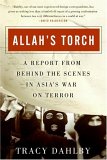Summary | Excerpt | Reviews | Beyond the Book | Readalikes | Genres & Themes | Author Bio

Critics' Opinion:
Readers' Opinion:
First Published:
Jan 2005, 320 pages
Paperback:
Dec 2005, 327 pages
 Book Reviewed by:
Book Reviewed by:
BookBrowse Review Team
Buy This Book
In Jakarta, meanwhile, Jaffar's threats of holy way had duly alarmed President Abdurrahman Wahid, a moderate Muslim cleric and Indonesia's first democratically elected leader since 1955. But when Wahid sent an order for Jaffar's arrest through constitutional channels, to both his armed forces chief of staff and his civilian defense minister, he was promptly ignored. Indonesia's military didn't cotton to Wahid's reformist plans to curb its vast powers, and so in the great wormy can of Indonesian politics, the Laskar Jihad had become -- as an authoritative report published by the Brussels based International Crisis Group, later put it -- "the greatest symbol of the government's impotence."
Jakarta is an inordinately gossipy place, and word on the street had run that Jaffar was looking for a way to inject three thousand jihadis into the Moluccas to begin cleansing them of their one million Indonesian Christians.And now, judging from the squatters on the decks of the Bukit Siguntang, the Laskar Jihad had found its opening— and, as luck would have it, Norman and I had found the Jihad.
"Sweet Jesus,"I gasped, as we dove inside our tiny, cell-like stateroom and locked the door. The sly, sharklike grins we’d encountered while picking our way across the jihadis’ cardboard archipelago had encouraged my stomach to contract into something roughly the size of a baseball. But this was no time to panic; I needed to think. Sitting down on one of a pair of grimy bunks, I said to Norman, as calmly as I could muster, "Why don’t you pop up to the bridge and see what the hell the captain thinks is going on around here."
"Sure thing, Boss," said Norman. Firing off a snappy salute, he was out the door in a flash, and glad to be gone, I wager. Norman really was an excellent traveling companion, full of rakish good humor or fire-and-fight as the situation required, but I was very upset with him just then and he knew it. Riding into a holy war with a bunch of wild-eyed jihadis wasn’t the trip he’d promised me. Far from it. What he’d promised was a rare glimpse of an untrammeled tropical paradise, a place of soaring green vistas and sparkling white sands—a place called the Banda Islands.
The Bandas, thirteen jots of volcanic rock located in a stretch of far ocean between the Java and Arafura seas, north of Australia and west of New Guinea, were interesting for a variety of reasons. It was there in 1512 that sailors, swabbing in the squadron of the Portuguese explorer Antonio de Abreu, had followed an alluring fragrance smack into the fabled islands to discover an incredibly large treasure hidden in a deceptively small package—the golden, walnut-sized fruit Myristica fragrans, otherwise known as the common nutmeg.
It is hard to fathom today just how popular the nutmeg was in Europe in those benighted days. More than three hundred years before the invention of anything remotely resembling either modern refrigeration or miracle drugs, the humble fruit, dried and grated, was prized (correctly) for keeping meat from rotting, and (wrongly but understandably) as a poultice for warding off the Plague, a.k.a. the Black Death, which had wiped out a full third of Europe’s population and was still at its deadly work. In addition, the nutmeg’s use as a tranquilizer, sleeping potion, and a medieval form of Viagra led to a stiffening demand that set its price in the bourses at Rotterdam, London, and Paris on a par with silver and gold.
And that was when it was available at all. Up to the time of Abreu’s discovery, the nutmeg had arrived in Europe as if by magic—traveling from the Orient by caravan through the bazaars of Central Asia, passing through many hands, exact point of origin unknown. When the Turks conquered Constantinople in 1453, effectively cutting off Europe’s fix, it was collective nutmeg withdrawal that helped propel Europe into its vaunted Age of Exploration. Christopher Columbus had been searching for a sea link to the "spiceries" of the East when he’d had the rum luck to bang into North America. When the luckier Abreu found his way into the Bandas two decades later, the tiny archipelago, the only known source of nutmeg on earth, quickly became a focal point of the global economy. As author Giles Milton notes in his riveting history Nathaniel’s Nutmeg, the shipyards of Portugal, Spain, England, and Holland went into "a flurry of activity that sparked what would later become known as the spice race, a desperate and protracted struggle for control of one of the smallest groups of islands in the world."
From Allah’s Torch by Tracy Dahlby. HarperCollins Publishers. Used by permission.




The dirtiest book of all is the expurgated book
Click Here to find out who said this, as well as discovering other famous literary quotes!
Your guide toexceptional books
BookBrowse seeks out and recommends the best in contemporary fiction and nonfiction—books that not only engage and entertain but also deepen our understanding of ourselves and the world around us.